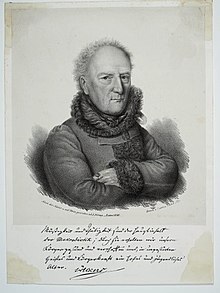Friedrich Carl Völckers

Friedrich Carl Völckers (born August 23, 1770 in Harburg , † July 22, 1866 in Eutin ) was a German doctor and Grand Ducal Oldenburg Councilor .
Live and act
Friedrich Carl Völckers was a son of Dietrich Ernst Völckers and his wife Marie Friederike, née Dürten. The father came from a Dutch family of shipbuilders from Groningen . After studying law at the University of Göttingen , he worked as an administrator of justice in the Harburg district . The mother came from Lower Saxony.
Völckers studied for five years at the University of Göttingen. After receiving his doctorate in 1793 as Dr. med. he worked as a physician in Verden , Wunstorf , Ratzeburg and from 1814 in Eutin. From the documents of his Eutin colleague Christoph Friedrich Hellwag it emerges that the Eutin doctors were in tough competition with one another at that time. During the Eutin period, he succeeded in reforming the health system, improving the medical profession for doctors and combating epidemics.
In 1816 Völckers published "Proposals for the establishment of a more appropriate Medicinal Constitution". In it he criticized the inadequate training of doctors. He called for training and examination regulations to be introduced in which prospective doctors should receive a certificate "after a strict examination". The doctorate should only be awarded to distinguished doctors, according to Völckers. From his point of view, to set up his “Medicinalaemter as the union of all doctors and surgeons in one country”. As civil servants, doctors should only receive a low fixed salary, because higher wages are not in line with medical professional ethics, according to the doctor.
Völckers harshly criticized the quacks in his writings . He demanded that surgeons in the cities and in the country should be banned from doing surgical or medical work. In the same way he rejected the superstition in folk medicine that was often persecuted at the time. He considered “folk arzney books” to be “a real poison” which should be replaced by “good, understandable semiotics”. He suggested establishing literature in all villages in which "the signs of dangerous and rapidly killing diseases are more clearly indicated". These could contain tips on how to use common home remedies in the early stages of the disease.
Völckers campaigned for strict controls on the manufacture and sale of drugs. For this purpose, new medical offices should be set up to monitor pharmacies. The pharmacists should no longer be called “material buyers”, but should be given a suitable training and then treated as scholars of higher rank.
In addition, Völckers advocated the smallpox vaccination , which at the time was not without complications. He countered assumptions from England that the vaccination was harmful. The doctor called for vaccinations to be controlled in a standardized manner. He also protested sharply against quacks who wanted to earn money with vaccination.
Grand Duke Friedrich Ludwig von Oldenburg appointed Völckers to court counselor and personal physician in 1839 because of his services.
He was married to Georgine Friederike Henriette, b. Meyer (1782-1858). The two had several sons, of whom the later Oldenburg politician Ludwig Völckers (1802–1849) was the eldest. The ophthalmologist Carl Völckers (1836–1914) was a grandson.
Works
- De impestivo evacuantium usu in febris gastricis. Göttingen: Barmeier 1793 ( digitized version )
- Proposals for the establishment of a more effective Medicinal Constitution. Eutin: Struve 1816
literature
- Rollo Völckers: Völckers, Friedrich Carl . in: Schleswig-Holstein Biographical Lexicon . Volume 2. Karl Wachholtz Verlag, Neumünster 1971, pp. 234-236.
- Henry A. Smith (Ed.): Eutin - Heidelberg 1811. Correspondence between the student Ernst Hellwag and his family in Eutin , Series: Eutiner Research Volume 11, Eutin State Library, 2009, ISBN 9783939643029 .
Individual evidence
- ^ Henry A. Smith (ed.): Eutin - Heidelberg 1811 , pp. 137-143 on the Eutin corset dispute
| personal data | |
|---|---|
| SURNAME | Völckers, Friedrich Carl |
| BRIEF DESCRIPTION | German doctor and Grand Ducal Oldenburg Councilor |
| DATE OF BIRTH | August 23, 1770 |
| PLACE OF BIRTH | Harburg |
| DATE OF DEATH | July 22, 1866 |
| Place of death | Eutin |